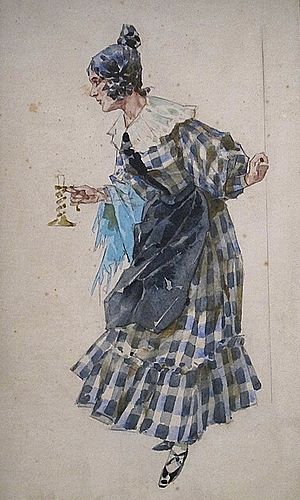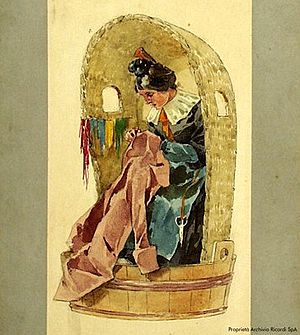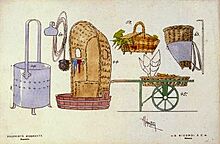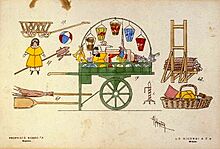La bohème facts for kids
Quick facts for kids La bohème |
|
|---|---|
| by Giacomo Puccini | |
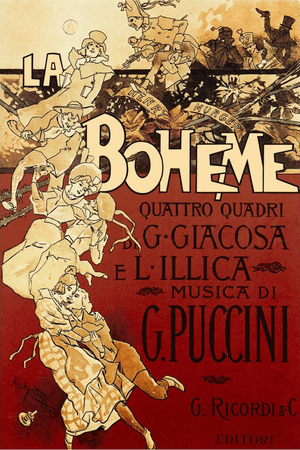
Original 1896 poster by Adolfo Hohenstein
|
|
| Librettist | |
| Language | Italian |
| Based on | Henri Murger's Scènes de la vie de bohème |
| Premiere | 1 February 1896: Teatro Regio, Turin |
La bohème ( LAH-_-BOH-em) is an opera in four acts, composed by Giacomo Puccini between 1893 and 1895 to an Italian libretto by Luigi Illica and Giuseppe Giacosa, based on Scènes de la vie de bohème (1851) by Henri Murger. The story is set in Paris around 1830 and shows the Bohemian lifestyle (known in French as "la bohème") of a poor seamstress and her artist friends.
The world premiere of La bohème was in Turin on 1 February 1896 at the Teatro Regio, conducted by the 28-year-old Arturo Toscanini. Since then, La bohème has become part of the standard Italian opera repertory and is one of the most frequently performed operas worldwide.
In 1946, 50 years after the opera's premiere, Toscanini conducted a commemorative performance of it on radio with the NBC Symphony Orchestra. A recording of the performance was later released by RCA Victor on vinyl record, tape and compact disc. It is the only recording ever made of a Puccini opera by its original conductor.
La bohème is also known for being the loose inspiration for the Broadway musical Rent by Jonathan Larson.
Contents
Origin of the story
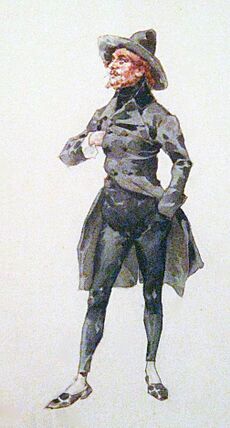
As credited on its title page, the libretto of La bohème is based on Henri Murger's 1851 novel, Scènes de la vie de bohème, a collection of vignettes portraying young bohemians living in the Latin Quarter of Paris in the 1840s. Although often called a novel, the book has no unified plot. Like the 1849 play drawn from the book by Murger and Théodore Barrière, the opera's libretto focuses on the relationship between Rodolfo and Mimì, ending with her death. Also like the play, the libretto combines two characters from the novel, Mimì and Francine, into the single character of Mimì. Early in the composition stage Puccini was in dispute with the composer Ruggero Leoncavallo, who said that he had offered Puccini a completed libretto and felt that Puccini should defer to him. Puccini responded that he had had no idea of Leoncavallo's interest and that having been working on his own version for some time, he felt that he could not oblige him by abandoning the opera. Leoncavallo completed his own version in which Marcello was sung by a tenor and Rodolfo by a baritone. It was not as successful as Puccini's and is now rarely performed.
Much of the libretto is original. Major sections of acts two and three are the librettists' invention, with only a few passing references to incidents and characters in Murger. Most of acts one and four follow the book, piecing together episodes from various chapters. The final scenes in acts one and four—the scenes with Rodolfo and Mimì—resemble both the play and the book. The story of their meeting closely follows chapter 18 of the book, in which the two lovers living in the garret are not Rodolphe and Mimì at all, but rather Jacques and Francine. The story of Mimì's death in the opera draws from two different chapters in the book, one relating Francine's death and the other relating Mimì's.
The published libretto includes a note from the librettists briefly discussing their adaptation. Without mentioning the play directly, they defend their conflation of Francine and Mimì into a single character: "Chi può non confondere nel delicato profilo di una sola donna quelli di Mimì e di Francine?" ("Who cannot confuse in the delicate profile of one woman the personality both of Mimì and of Francine?"). At the time, the book was in the public domain, Murger having died without heirs, but rights to the play were still controlled by Barrière's heirs.
Roles
| Role | Voice type | Premiere cast, 1 February 1896 Conductor: Arturo Toscanini |
|---|---|---|
| Rodolfo, a poet | tenor | Evan Gorga |
| Mimì, a seamstress | soprano | Cesira Ferrani |
| Marcello, a painter | baritone | Tieste Wilmant |
| Musetta, a singer | soprano | Camilla Pasini |
| Schaunard, a musician | baritone | Antonio Pini-Corsi |
| Colline, a philosopher | bass | Michele Mazzara |
| Benoît, their landlord | bass | Alessandro Polonini |
| Alcindoro, a state councillor | bass | Alessandro Polonini |
| Parpignol, a toy vendor | tenor | Dante Zucchi |
| A customs Sergeant | bass | Felice Foglia |
| Students, working girls, townsfolk, shopkeepers, street-vendors, soldiers, waiters, children | ||
Instrumentation
La bohème is scored for:
- woodwinds: piccolo, 2 flutes, 2 oboes, cor anglais, 2 clarinets (A, B-flat), bass clarinet (A, B-flat), 2 bassoons
- brass: 4 horns in F, 3 trumpets in F, 3 trombones, bass trombone
- percussion: timpani, snare drum, triangle, cymbals, bass drum, xylophone, glockenspiel, chimes
- strings: harp, violins I, II, viola, cello, double bass
- off-stage (end of act 2): 4 piccolos, 6 trumpets, 2 snare drums (occasionally on-stage)
Recording history
The discography of La bohème is a long one with many distinguished recordings, including the 1972 Decca recording conducted by Herbert von Karajan with Luciano Pavarotti as Rodolfo and Mirella Freni as Mimì (made before Pavarotti became an international superstar of opera), and the 1973 RCA Victor recording conducted by Sir Georg Solti with Montserrat Caballé as Mimì and Plácido Domingo as Rodolfo which won the 1974 Grammy Award for Best Opera Recording. The 1959 recording conducted by Tullio Serafin with Renata Tebaldi as Mimì and Carlo Bergonzi was included in the soundtrack of the 1987 movie Moonstruck.
The earliest commercially released full-length recording was probably that recorded in February 1917 and released on HMV's Italian label La Voce del Padrone. Carlo Sabajno conducted the La Scala Orchestra and Chorus with Gemma Bosini and Reno Andreini as Mimì and Rodolfo. One of the most recent is the 2008 Deutsche Grammophon release conducted by Bertrand de Billy with Anna Netrebko and Rolando Villazón as Mimì and Rodolfo.
There are several recordings with conductors closely associated with Puccini. In the 1946 RCA Victor recording, Arturo Toscanini, who conducted the world premiere of the opera, conducts the NBC Symphony Orchestra with Jan Peerce as Rodolfo and Licia Albanese as Mimì. It is the only recording of a Puccini opera by its original conductor. Thomas Beecham, who worked closely with Puccini when preparing a 1920 production of La bohème in London, conducted a performance of the opera in English released by Columbia Records in 1936 with Lisa Perli as Mimì and Heddle Nash as Rodolfo. Beecham also conducts on the 1956 RCA Victor recording with Victoria de los Ángeles and Jussi Björling as Mimì and Rodolfo.
Although the vast majority of recordings are in the original Italian, the opera has been recorded in several other languages. These include: a recording in French conducted by Erasmo Ghiglia with Renée Doria and Alain Vanzo as Mimì and Rodolfo (1960); a recording in German with Richard Kraus conducting the Deutsche Oper Berlin Orchestra and Chorus with Trude Eipperle and Fritz Wunderlich as Mimì and Rodolfo (1956); and the 1998 release on the Chandos Opera in English label with David Parry conducting the Philharmonia Orchestra and Cynthia Haymon and Dennis O'Neill as Mimì and Rodolfo.
Enrico Caruso, who was closely associated with the role of Rodolfo, recorded the famous aria "Che gelida manina" in 1906. This aria has been recorded by nearly 500 tenors in at least seven different languages between 1900 and 1980. In 1981 the A.N.N.A. Record Company released a six LP set with 101 different tenors singing the aria.
The missing act
In 1957 Illica's widow died and his papers were given to the Parma Museum. Among them was the full libretto to La bohème. It was then discovered that the librettists had prepared an act which Puccini decided not to use in his composition. It is noteworthy for explaining Rodolfo's jealous remarks to Marcello in act 3.
The "missing act" is located in the timeline between the Café Momus scene and act 3 and describes an open-air party at Musetta's dwelling. Her protector has refused to pay further rent out of jealous feelings, and Musetta's furniture is moved into the courtyard to be auctioned off the following morning. The four Bohemians find in this an excuse for a party and arrange for wine and an orchestra. Musetta gives Mimì a beautiful gown to wear and introduces her to a Viscount. The pair dances a quadrille in the courtyard, which moves Rodolfo to jealousy. This explains his act 3 reference to the "moscardino di Viscontino" (young fop of a Viscount). As dawn approaches, furniture dealers gradually remove pieces for the morning auction.
Ruggero Leoncavallo composed an opera based the same source material, also titled La bohème; this episode is included in Leoncavallo's treatment which premiered in 1897.
Derivative works
In 1959 "Musetta's Waltz" was adapted by songwriter Bobby Worth for the pop song "Don't You Know?", a hit for Della Reese. Earlier, it was used for another song, "One Night of Love".
In 1969 in Paris, American free-jazz pianist Dave Burrell recorded his La Vie de Bohème with a seven-piece group of European and American musicians. The music on the double-LP is improvised and experimental, but the listener can still discern Puccini's themes, as well as the narrative arc of the complete opera.
Rent, a 1996 musical by Jonathan Larson, is based on La bohème. Here the lovers, Roger and Mimi, are faced with AIDS and progress through the action with songs such as "Light My Candle", which have direct reference to La bohème. Many of the character names are retained or are similar (e.g. the character Angel is given the surname "Schunard"), and at another point in the play, Roger's roommate and best friend Mark makes a wry reference to "Musetta's Waltz", which is a recurring theme throughout the first act and is played at the end of the second act.
The opera was adapted into a 1983 short story by the novelist V. S. Pritchett for publication by the Metropolitan Opera Association.
Modernizations
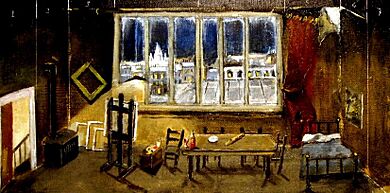
Baz Luhrmann produced the opera for Opera Australia in 1990 with modernized supertitle translations, and a budget of only A$60,000 (A$130,545.17 in 2022). A DVD was issued of the stage show. According to Luhrmann, this version was set in 1957 (rather than the original period of 1830) because "...[they] discovered that 1957 was a very, very accurate match for the social and economic realities of Paris in the 1840s." In 2002, Luhrmann restaged his version on Broadway, the production won two Tony Awards out of six nominations; for Best Scenic Design and Best Lighting Design as well as a special award, the Tony Honor for Excellence in Theatre. This rendition is notable for being the debut of Joe Jonas, who portrayed Oliver. To play the eight performances per week on Broadway, three casts of Mimìs and Rodolfos, and two Musettas and Marcellos, were used in rotation.
Robin Norton-Hale directed a new production at the Cock Tavern Theatre, Kilburn, for OperaUpClose in December 2009. For act 2 the entire audience and cast moved downstairs to the pub itself, with the pub's patrons serving as extras in the Cafe Momus scene. In 2010 the production was transferred to the West End's Soho Theatre and won a Laurence Olivier Award.
A 2019 production by Canada's Against the Grain Theatre featured a translated English libretto, and transposed the story to a contemporary Canadian urban setting. This production toured several Canadian cities before its production at Toronto's Tranzac Club was livestreamed by CBC Gem on 13 October. The CBC broadcast received two Canadian Screen Award nominations at the 9th Canadian Screen Awards in 2021, for Best Performing Arts Program and Best Direction in a TV Movie.
See also
 In Spanish: La bohème (Puccini) para niños
In Spanish: La bohème (Puccini) para niños


